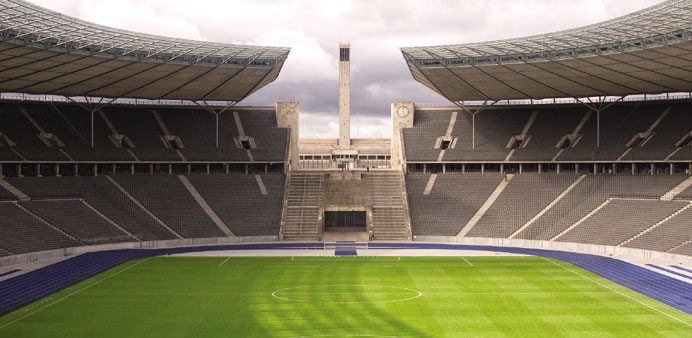DPA/Berlin
Bayern Munich’s Jerome Boateng has already won one Champions League title with the club but the Berlin-born defender is relishing the opportunity to lift the famous trophy again in his hometown this June.
“Winning the Champions League for a second time with Bayern, and especially in the city of my birth, would be an absolute dream for me,” Boateng said.
The final in the Olympic Stadium on June 6 is just 100 days away with Berlin hosting Europe’s premier club fixture for the first time.
Boateng and Bayern must first overcome Shakhtar Donetsk in the round of 16 to keep the dream alive while three other Bundesliga clubs - Schalke, Borussira Dortmund and Bayer Leverkusen - also remain in the competition.
Seven previous European Cup/Champions League finals have been held in Germany - four in Munich, two in Stuttgart and one in Gelsenkirchen - but now it is the capital’s turn to shine.
“The Champions League final has an exceptional importance as the crown of European club football and is of the highest worth to the image of Berlin,” the city councillor for sport Frank Henkel said.
The politician considers the global television coverage an “excellent platform” for Berlin to promote itself as a sport venue, nine years after Italy lifted the World Cup in the city having defeated France in a penalty shoot-out.
Berlin is currently battling Hamburg to be named as Germany’s candidate to host the 2024 Summer Olympic Games but the capital could also welcome another major final that year in the shape of Euro 2024.
“There is no better advertising event,” Berlin Football Association (BFV) president Bernd Schultz said of the Champions League final. The BFV is responsible for recruiting 500 volunteers to help at the game and, with tickets likely scarce, applications will be plentiful.
“Berlin will be full of fans, even if they are not in the stadium,” Christoph Meyer of the Olympiastadion company, responsible for the hosting of the final, predicted.
“They will book hotels and go to restaurants. This is a great football party and Berlin cannot lose.”
Since being awarded the final in May 2013, the stadium operating company has been working with the German Football Association (DFB) and UEFA to organize the event.
Most of the planning is done but for Meyer the biggest challenge begins after the stadium hosts the German Cup final on May 30, one week before the Champions League match.
“That means working day and night,” he said. A lot of that happens is behind the scenes though up to 1,500 volunteers that week will aid the transformation of the stadium from the green colour of the DFB to the blue tones of UEFA.
On the day of the final itself, Meyer believes 5,000 workers will be engaged.
He is likely to be as busy as any of them and does not expect to see much of the game but that does not detract from his feeling of euphoria.
“The Champions League final is something Berlin had been missing,” he said.

Berlin’s Olympic Stadium
